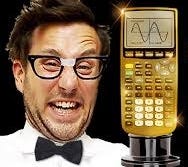Quick yet intimidatingly sophisticated thoughts on those calculoconverters

You have surely noticed that there are a number of online calculators and charts out there for estimating your capabilities at a given race distance based on your times at other distances. This one happens to be my favorite, this one is sound too, and this one seems to be the one a plurality, or maybe even a majority, of runners swear by. There are numerous others.
Years ago, I started referring to these gizmos and tables as "calculoconverters" in an effort to lightly disparage them or at least discourage people's rigid adherence to them. Maybe my effort was too light, because a number of people on the forums I haunted started using this neologism while making it clear they still placed supreme value on the output of the tools it describes.
Catherine Ndereba is a former world-record holder in the marathon, running 2:18:47 in Chicago in 2001 and breaking Naoko Takahashi's seven-day-old mark by 59 seconds. (This meant that the women's WR had come down by 1:56 in a span of just over a week). Earlier the same year, Ndereba ran 1:07:54 for the half-marathon, and she later ran 31:02 for 10K. Along with the 15:09 5K she ran in 1998, these remained her lifetime personal bests.
Not one of these calculators would have given Ndereba a turd's chance on a germophobe's bathroom floor of running anywhere close to 2:18 for the marathon, or 2:20, or 2:22. Conventional wisdom or at least its equivalent in the running world suggests that you need to be able to break 30:00 for 10K to run a sub-2:20 marathon. Ndereba could not, or at least did not, run even 5K at the "required" 10K pace.
While it is possible that Catherine the Great (who made me moderately famous in very small New England circles when she blew my doors off with about a mile to go in the 2001 Boston Marathon, an event caught on regional and possibly national television) was a beneficiary of EPO -- and while I dislike casting aspersions at her, it would simply be naive to ignore the possibility -- and therefore would have displayed less of a drop-off with increasing distance than a clean athlete, the thing to pay attention to is that high-mileage athletes who train specifically for the marathon and have a very high fraction of Type II muscle fibers essentially lay waste to any and all calculoconverters.
My own road PRs heading into the 2001 Boston Marathon were 15:25 and 32:04, although I had run 1:08:28 for a half six months earlier. I "shouldn't" have been able to run 2:24:17, with our without losing time to a series of port-a-john stops. Fortunately I didn't internalize this "reality."
The one thought I want to leave you with is this: If such tools are reliable, why are there so many of them, almost all of them the product of highly dexterous, analytical and educated minds?
There are a lot of religions to pick from out there -- many major ones and countless minor ones. By definition these are mutually incompatible. The inescapable scientific conclusion is that the likelihood of any one of these countless religions being correct is vanishingly small (although this is true for other reasons as well). But that doesn't mean religions have nothing to offer, only that it's fair to pick and choose what applies to you and your life and ignore all of the bullshit.
And so it is with...hell, you can calculointuit the rest.

